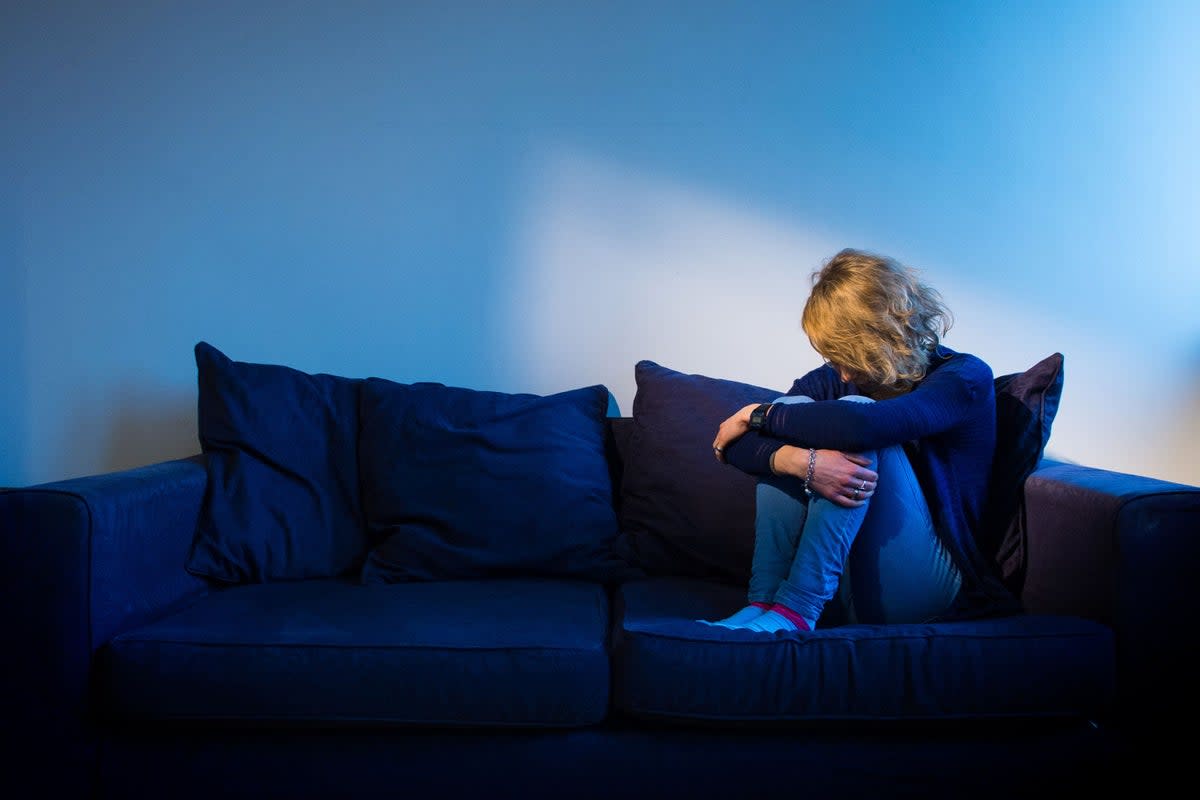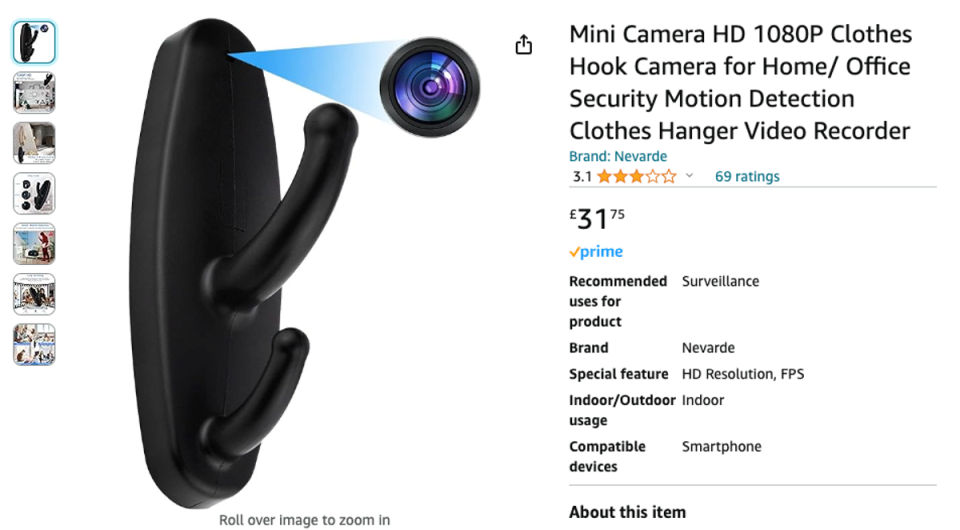The woman who found 80 spycams in her home

The easy availability of spy cameras and the proliferation of smart speakers have made it easier than ever to snoop on people in their own homes, according to a leading women’s charity. Even worse is that much of this tracking is being conducted by supposed loved ones.
In one case, more than 150 recording devices were found in the home of a single domestic violence victim, including 80 cameras and 70 other recording devices. Some of these were everyday gadgets, such as Amazon Alexa devices, as well as dozens of hidden cameras that are freely marketed as being for covert surveillance by big online retailers.
Smart speakers — now often fitted with cameras as well as microphones — have become a common feature in our homes. More than four in 10 homes have at least one smart speaker, according to Ofcom research published earlier this year, with 45 per cent of those owners having two or more devices. It has become socially acceptable to put these devices in places such as bedrooms, often without people considering the consequences for their own privacy and that of their family members.
Even some smoke alarms now have CCTV built into them, ostensibly for security but tempting for other purposes. In reality, many time-pressed Londoners invest in these types of gizmos without thinking too much about whether it's acceptable to covertly keep track of casual workers, such as cleaners or nannies.
Perhaps it is time to challenge ourselves if it’s reasonable to peer at what others are up to without their consent. After all, just because you can technically do something does not mean that you should.
Clothes hook spy cameras for sale on Amazon
In addition to these so-called smart devices, there’s also a growing market for outright spy cameras on sites such as eBay and Amazon. These are often hidden inside common household objects, such as radio alarm clocks or dummy smoke alarms, to make them difficult for victims to spot.
Amazon also sells spy cameras concealed inside clothes hooks, despite facing a lawsuit over the divisive gadgets.
Several reports claim the products are easy to find on the company’s website. The Standard spotted several spy camera clothes hooks for sale on Amazon from third-party sellers. Some of the listings showed the cameras being used in bathrooms.
In March, a US judge ruled that Amazon must face a lawsuit by a woman who claims she was covertly filmed using a clothes hook cam in 2021. At the time, she was a minor, according to her legal complaint.
“Amazon cannot claim surprise when a consumer uses the camera that way,” the judge said.
The Standard has reached out to Amazon for comment.

Domestic abuse charities say these types of devices are too easy to acquire. “If you type in ‘hidden cameras’, ‘spyware’, ‘spy on my partner’, you will get an influx of recording devices [and] secret hidden cameras,” said Emma Pickering, head of operations for the tech and economic team at Refuge. “They’re not even pretending to be something else.
“We have tried to report [spy cameras] to Amazon and eBay on numerous occasions and say we cannot see the purpose of this product being on the market and accessible for people to purchase,” adds Pickering. “It’s only creating harm and we have evidence that it does that.”
Cameras in every room
One such victim of spycams was Megan, a mother of two young children, who suffered verbal and physical abuse at the hands of her partner for six years. Megan sought help from Refuge when her controlling partner confronted her about conversations she had had in their family home when he was out of the house.
With the help of the charity and the police, a sweep was conducted of Megan’s home which found the largest number of recording devices that the police had ever found in one property. Cameras were hidden in the living room, kitchen, garden, sheds, bathrooms, children’s rooms, and bedrooms.
The case highlights the lack of clear legislation regarding people using recording equipment to spy on partners in their own homes. Pickering describes the lack of legislation governing the use of recording equipment in homes as a “black hole” and the Information Commissioner’s Office declined to comment to the Standard when asked whether it had any specific guidance on the use of cameras within the home.
Pickering is clear, however, that the tech retailers and Government need to do more when it comes to selling spycams. “They should be regulated and removed from platforms, so it’s not easy and accessible for people to be purchasing them,” she said.
A spokesperson for eBay said: “We prohibit the sale of any item that encourages illegal behaviour and all eBay sellers are required to comply with applicable UK law and our policies. On the rare occasion that we find an item in breach of this, we remove it from our site and take action against the seller. However, the listings you shared with us do not violate our policy.”
Amazon was approached for comment.
What to do if you think you are being spied on
There are many ways to track people with everyday technology. Here is what to do if you think you are being spied on by a partner or someone else — and how you can block tracking.
Do not remove trackers until it is safe
If you are in an abusive relationship and you think you have found cameras or other devices that are tracking you, don’t remove them. Instead, seek expert help and create a safety plan. “It’s really important that you try and speak to somebody to create a safety plan, but not to do so within the home,” says Ms Pickering.
“Use a safe phone if you’re concerned that your phone is being monitored, use a burner phone, use a ‘safe’ family or trusted friend’s phone. Make a call outside of the property and speak to somebody like the National Domestic Abuse Helpline [0808 2000 247].”
Spot the signs of surveillance
There are often telltale signs that abusers are installing surveillance equipment. “They will suddenly do a fair bit of DIY,” explains Ms Pickering, “because what we’ve noticed they like to do is hide them [cameras] behind light fittings and things like that.” Another common place for recording devices is the USB ports on the back or sides of televisions.
Is my phone being tracked?
The easiest way to track someone’s phone is with the built-in services created by Apple and Google. These are ostensibly to help you locate lost phones or children, but they are commonly used by controlling partners to keep tabs on someone’s location.
On iPhones, you can open the Find My app and see if your device location is being shared under the Me tab. On Android, open settings and search for “find my device” and see if it is switched on for your phone. There are also plenty of third-party apps that track location, which may have been installed on your phone when you weren’t looking. Again, don’t switch off tracking until you’ve sought help and created a safety plan.
Other ways people can track your location
Apple’s AirTag devices are handy for locating lost luggage, but they can also be used to track people. They are all too easy to slip into someone’s bag, coat, or car without permission. In fact, Apple has taken measures to make these trackers easier to spot. If you use an iPhone, for example, you might get an alert on it if it detects a nearby AirTag that’s not within range of its owner’s iPhone. If you’re an Android user, you can perform a manual scan for rogue AirTags with the Tracker Detect app. The AirTag should also make a beeping sound if it is separated from its owner but only after a day or two.
Be wary of everyday devices
It’s not only dedicated spyware equipment you need to consider. Many ordinary devices routinely cause problems, too. For example, Amazon Echo speakers have a feature called “drop-in” which allows device owners to eavesdrop on conversations in the home when they’re not there. Smart doorbells, baby-monitoring cameras, or pet cameras can also be used for similar purposes. Don’t assume that these innocent gizmos are always being used for their original intended purpose.
For further details and guidance on computer-facilitated abuse, check Refuge’s site.

 Yahoo News
Yahoo News 
